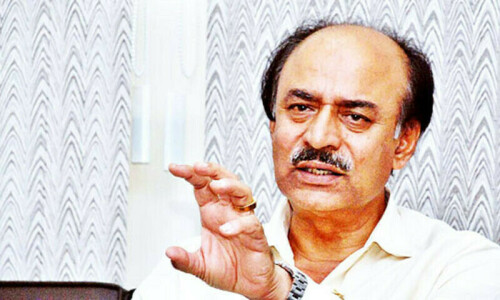UMERKOT: Describing the Thar coal project as an enemy of flora, fauna, human beings and agriculture, environmental experts and civil society activists have demanded complete share of water for the people of Umerkot and Thar, rejecting water schemes for mining.
The demand was made at a consultative meeting organised by the Pakistan Fisherfolk Forum (PFF), and attended by people in a large number on Tuesday.
Addressing the meeting, PFF chairman Mohammad Ali Shah said that using fresh water for Thar coal mining would have negative impacts on the life of people and environment of the area. Makhi Farash link canal had already been facing an acute water shortage and again lifting the water level to 200 cusecs for the mining project would accelerate economic problems, including food insecurity.
Professor Ismail Kunbhar of Sindh Agriculture University Tandojam said people in progressive countries considered coal energy as dirty energy and protests were held against coal-based power projects. Several countries were giving up coal power plants while it was being given priority in Pakistan. “Production of coal energy is destruction and not development,” he said.
He said that coal energy would produce pollution and greenhouse gases that would be harmful for the environment, flora and fauna, and human beings.
A lot of water would be needed to clean coal that would pollute drinking water channels, he said, adding that Thar already had limited water resources which would come to an end if the project was not stopped.
Mir Hassan Arisar said the local elected representatives had failed in protecting the interests of their areas. But now growers should stand up, otherwise they would be left to cry over spilt milk, he added.
He said it was promised that the Gorano reservoir would be used for fish and vegetables, but it had too much salinity that would be harmful for people as well as animals.
G.M. Bhagat said Sindh had always been victimised, by initially bulldozing the water accord 1945 while 1991 Water Accord could not benefit the province. Three rivers were “sold” and the share of Sindh was “snatched”, he added.
He said the cabinet had decided to build Kotri Barrage at the expense of the Sindh government, and 600,000 acres land was to be distributed among Sindhi peasants. But 75 per cent lands were distributed among in-service and retired personnel while 400,000 peasants were displaced, he added.
Tarbela, Guddu barrages and Mangla Dam were built to safeguard the interests of the establishment, he claimed.
He said the release of water at the head of Nara Canal was decided at 13,202 cusecs, but at present it had 14,445 cusecs. It would have irrigated two million acres lands on the right bank and not a single drop or canal was allowed on the left bank, he said.
Mr Bhagat said Jamrao, Mithrao, Khipro, Makhi Farash, Farash were canals on it. As per release of water at head, Farash should have 3,100 cusecs, but sorrowfully it had been receiving only 600 to 800 cusecs. Hiral, Distry, Sarhari, Soofi, Drain, Dhoronaro and Attai canals, and Chhor Wah, Noor Wah and Kot Wah carried water from it, he added.
Expressing his concerns regarding the mechanism of the Environmental Social Impact Assessment, a social activist, Ali Akbar Rahimoon, said the Sindh Environmental Protection Agency had been committing “crime” to accommodate and facilitate companies which had failed to follow the rules, principles and requirements agreed upon.
Published in Dawn, July 24th, 2020















































Dear visitor, the comments section is undergoing an overhaul and will return soon.